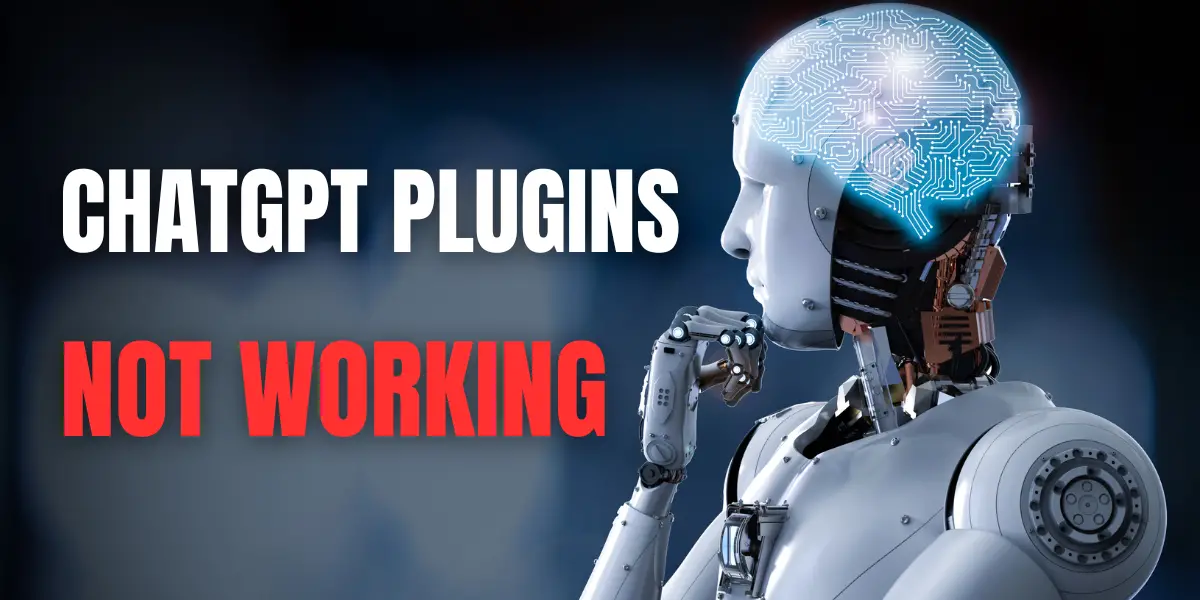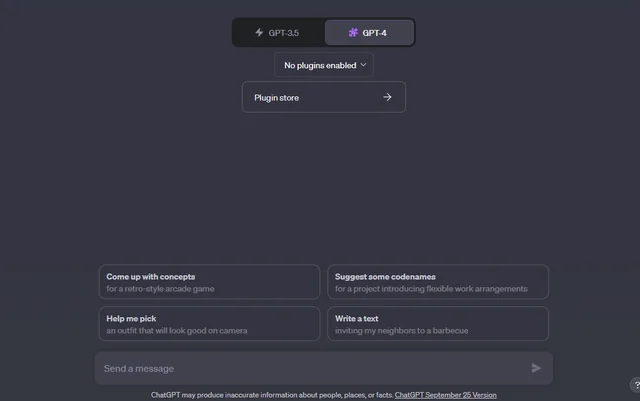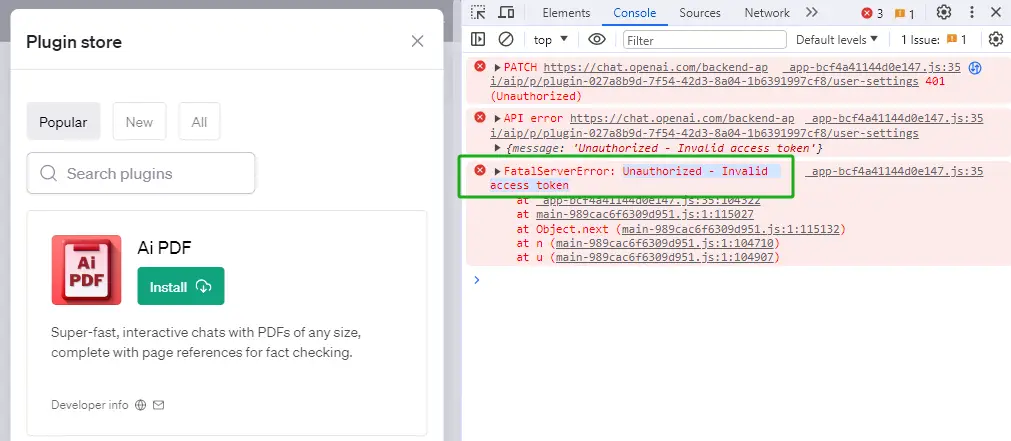ChatGPT Plugins Not Working: An Analysis of Errors

In recent times, there has been a surge in reports from users experiencing issues with ChatGPT plugins, as evidenced by discussions on Reddit threads like this and this. A common theme among these reports is the appearance of JavaScript console errors pointing towards an authorization or token issue. In this article, we will delve into the potential causes of these issues and explore possible solutions.
ChatGPT plugins, designed to augment the core system’s capabilities, have recently faced issues, with users reporting JavaScript console errors related to authorization. While potential causes range from expired tokens to corrupted plugin data, solutions include refreshing tokens, updating the plugin, checking browser permissions, and reinstalling the plugin. These plugins play a pivotal role in integrating ChatGPT into various platforms, transforming it into chatbots, voice assistants, and more.
Table of Contents
What is ChatGPT Plugin?
ChatGPT, a product of OpenAI, is renowned for its conversational capabilities. The term “ChatGPT Plugin” refers to extensions or add-ons designed to enhance or modify the functionality of ChatGPT. These plugins can be integrated into various platforms or applications, allowing developers and users to customize their ChatGPT experience. Just like browser plugins that add specific features or functionalities, ChatGPT plugins can introduce new capabilities or streamline existing ones.
What are the uses of ChatGPT Plugin?
ChatGPT plugins are extensions designed to augment the capabilities of the core ChatGPT system. They offer a range of functionalities tailored to diverse needs. Here’s a brief overview followed by a list of potential uses:
- Integration with Platforms: Enables ChatGPT to be embedded into various platforms like websites, apps, or even IoT devices.
- Customer Service: Transform ChatGPT into a responsive chatbot for websites, handling queries and providing instant support.
- Voice Responses: Equip ChatGPT with voice capabilities, turning it into a voice assistant for various tasks.
- Specialized Responses: Tailor ChatGPT’s responses to specific industries or niches, such as medical advice, tech support, or educational tutoring.
- Multimedia Integration: Allow ChatGPT to interact with or generate multimedia content, enhancing user engagement.
What's the Issue?

ChatGPT plugins, designed to enhance the capabilities of the core ChatGPT system, have recently been under scrutiny due to a series of reported malfunctions. Users have taken to platforms like Reddit to express their concerns, with a recurring theme being JavaScript console errors. These errors, often pointing towards an authorization or token-related problem, have disrupted the seamless experience users expect from ChatGPT. Such issues not only hinder the user experience but also raise questions about the reliability and stability of the plugins. The frequency of these reports suggests that this isn’t an isolated incident but a more widespread problem that needs immediate attention. Addressing this requires a deep dive into the potential causes and a comprehensive understanding of the underlying systems.

Possible Causes of ChatGPT Plugins Not Working
1. Expired Tokens
Tokens, digital keys for authentication, have a finite lifespan. Once they expire, they can no longer validate user requests. In the context of ChatGPT plugins, if a token becomes invalid or expires, it can lead to authorization errors. This is a common challenge in web applications, where tokens ensure secure user interactions but need periodic renewal.
2. Plugin-Server Mismatch
The dynamic nature of software means that updates are frequent. If the server that a plugin communicates with undergoes changes or updates, and the plugin doesn’t adapt, it can lead to compatibility issues. This mismatch can manifest as authorization errors, especially if new security protocols or data exchange formats are introduced.
3. Browser Restrictions
Browsers are the gatekeepers of the web, ensuring that user interactions are secure. Modern browsers, with their stringent security protocols, can block requests they deem insecure or unauthorized. If a ChatGPT plugin tries to access resources without the proper permissions or in a potentially insecure manner, the browser might block it, leading to the reported errors.
4. Corrupted Plugin Data
Software corruption is an age-old issue. If a plugin’s data, configuration, or even its core code gets corrupted, it can lead to unpredictable behavior. In the case of ChatGPT plugins, this could manifest as authorization errors, especially if the corruption affects data related to user authentication or session management.
Solutions of ChatGPT Plugins Not Working
1. Refresh Tokens
Tokens are pivotal in ensuring secure interactions in web applications. When faced with expired tokens, the immediate solution is a refresh. Most systems are designed to automatically refresh tokens, but sometimes manual intervention is required. Users can often resolve this by logging out and logging back in, prompting the system to issue a new token. Developers can also implement mechanisms to preemptively refresh tokens before they expire, ensuring uninterrupted service. Additionally, providing clear error messages can guide users on steps to take, reducing frustration and improving user experience.
2. Update the Plugin
In the ever-evolving world of software, staying updated is crucial. If a ChatGPT plugin is facing compatibility issues due to server updates, the most straightforward solution is to update the plugin. Developers should ensure that they release timely updates whenever backend changes occur. Users, on their part, should regularly check for and install plugin updates. This not only resolves compatibility issues but also often brings in new features and improved security.
3. Check Browser Permissions
Browsers play a protective role, shielding users from potential threats. If a ChatGPT plugin is being blocked due to browser restrictions, users should check the plugin’s permissions. This might involve navigating to the browser’s settings, ensuring that the plugin has the necessary permissions, and making exceptions if deemed safe. Alternatively, users can try accessing the plugin in a different browser or even in incognito mode, which sometimes bypasses certain restrictions.
4. Reinstall the Plugin
When all else fails, going back to basics can help. If a plugin’s data or configuration is suspected to be corrupted, uninstalling and then reinstalling the plugin can often reset it to its default state, resolving many issues. This action clears out potentially corrupted data and ensures that the latest version of the plugin is installed, addressing both corruption and compatibility issues.
Is the ChatGPT Plugin issue related to DALL-E 3's advanced user orientation?
DALL-E 3, another product from OpenAI, is designed for generating images from textual descriptions. While both ChatGPT and DALL-E 3 are part of OpenAI’s ecosystem, their functionalities and purposes are distinct. Issues arising with ChatGPT plugins are primarily related to the integration and functioning of ChatGPT in various platforms. DALL-E 3’s orientation towards advanced users focuses on its image generation capabilities and might not directly correlate with ChatGPT plugin issues. However, as with any interconnected ecosystem, there could be indirect influences or shared backend systems that might have cascading effects. But, without specific details, it’s challenging to draw a direct link between the two.
Conclusion
While the appearance of JavaScript console errors, especially those related to authorization, can be frustrating, understanding the potential causes can help in troubleshooting and resolving the issue. By staying updated, ensuring compatibility, and regularly checking for any discrepancies, users can enjoy a smoother experience with ChatGPT plugins.

